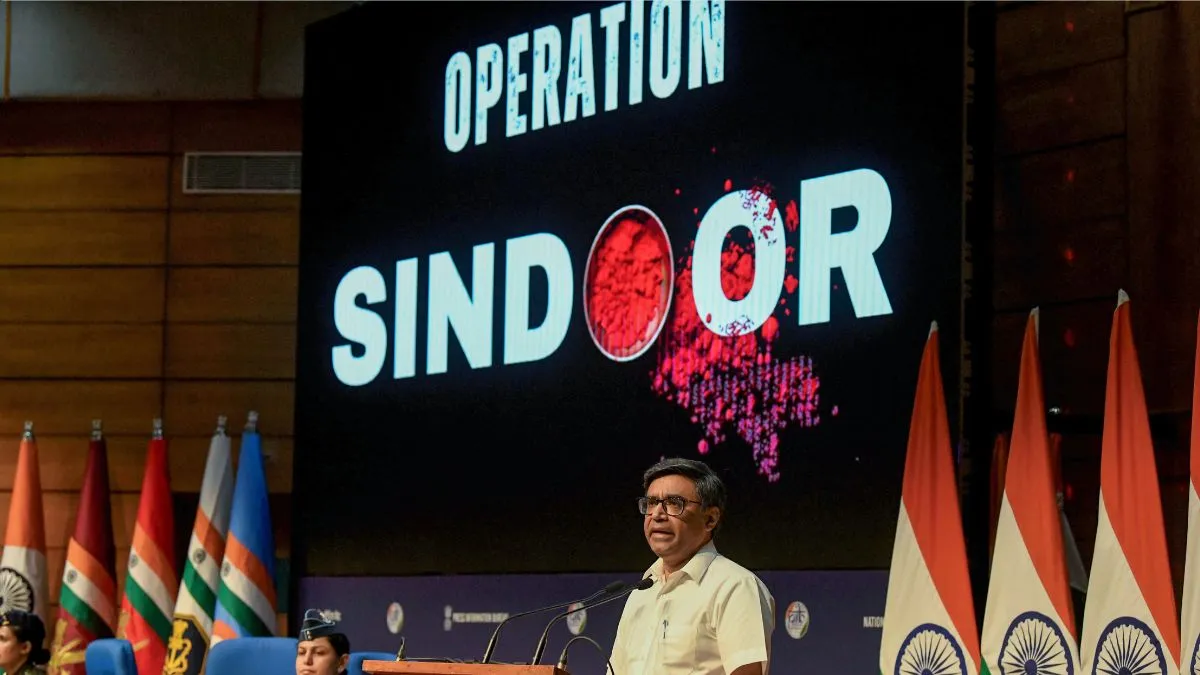- By Shivangi Sharma
- Thu, 08 May 2025 06:54 PM (IST)
- Source:JND
India's decisive response to the Pahalgam terror attack through Operation Sindoor on May 7–8, 2025, drew strong international attention. The strike, which targeted terror infrastructure in Pakistan and Pakistan-occupied Kashmir, followed a barbaric terrorist assault on Indian soil on April 22. India has made it clear that it does not seek escalation. The global community is closely observing the situation, with many nations voicing support for India's right to self-defence, and some others urging restraint.
India Briefs Global Leaders Amidst Missile Threats
On May 8, India's Ministry of Defence revealed that Pakistan attempted a large-scale drone and missile attack across major Indian cities and military targets, including Jammu, Srinagar, Pathankot, Amritsar, and Chandigarh. However, India's Integrated Counter-UAS Grid and Air Defence Systems successfully neutralised these threats.
The Indian government also convened an all-party meeting to share details of the successful operation and its implications. India reiterated that its response was decisive to cross-border terror, not seeking an all-out war.
Brazil: Solidarity From Global South
Brazilian President Luiz Inácio Lula da Silva called Prime Minister Narendra Modi on Thursday to express condolences for the Pahalgam attack and affirm Brazil’s support in India's fight against terrorism. The two leaders also reiterated their commitment to strengthening the India-Brazil strategic partnership, especially with Brazil holding the BRICS presidency this year.
President Lula de Silva of Brazil @LulaOficial called PM @narendramodi and conveyed condolences at the loss of lives in the terrorist attack in Pahalgam, India. He expressed support and solidarity with 🇮🇳 in its fight against terrorism. PM thanked President Lula for his…
— Randhir Jaiswal (@MEAIndia) May 8, 2025
Israel: Strong Backing Of India's Right To Self-Defence
Israel came out vocally in India’s favour. Ambassador Reuven Azar posted on social media that “Israel supports India’s right to self-defence” and declared that “there’s no place to hide for terrorists.” Prime Minister Benjamin Netanyahu echoed this sentiment, reaffirming that Israel “stands with India in its fight against terrorism.”
Israel supports India’s right for self defense. Terrorists should know there’s no place to hide from their heinous crimes against the innocent. #OperationSindoor
— 🇮🇱 Reuven Azar (@ReuvenAzar) May 7, 2025
Europe: Clear Condemnations and Calls for Restraint
The Netherlands MP Geert Wilders supported India unequivocally, tweeting “Kashmir is 100% Indian” and using the hashtag #PakistanBehindPahalgam.
I love India ❤️💪 🇮🇳 #Kashmir is 100% Indian.#India #OperationSindhoor #PakistanBehindPahalgam pic.twitter.com/ohmTLyOG2X
— Geert Wilders (@geertwilderspvv) May 7, 2025
Germany and the UK took a balanced stance, condemning the Pahalgam attack, supporting counter-terror measures, but urging both nations to avoid further escalation. UK Foreign Secretary David Lammy stressed the importance of restoring regional stability, while former Prime Minister Rishi Sunak strongly defended India’s retaliatory strikes, stating that “there can be no impunity for terrorists.”
The UK government is urging India and Pakistan to show restraint and engage in direct dialogue to find a swift, diplomatic path forward.
— David Lammy (@DavidLammy) May 7, 2025
My statement: https://t.co/20gbUHjtue
ALSO READ: How Muslim Countries Responded To India's Powerful 'Operation Sindoor' Against Pakistan
Japan: Condemnation of Terror, Caution Against Escalation
Japan’s Chief Cabinet Secretary Yoshimasa Hayashi condemned the April 22 attack, warning that continued retaliation could spiral into full-scale conflict. Japanese Foreign Minister Iwaya Takeshi reiterated Japan’s strong stance against terrorism and urged India and Pakistan to pursue a peaceful resolution through dialogue.
Russia And China: Strategic Caution
Russia expressed concern over the growing military confrontation and called for restraint while reaffirming its condemnation of terrorism. Moscow’s official statement noted the importance of “global cooperation” in countering terror.
China, while acknowledging the escalation, took a more neutral tone. It expressed regret over India’s military action and called on both nations to “exercise restraint.” Beijing also expressed willingness to play a “constructive role” in reducing tensions, while clearly stating its opposition to terrorism.
Middle East
Qatar’s Prime Minister reached out to Indian EAM S. Jaishankar and emphasised dialogue and diplomacy. Panama, a non-permanent member of the UN Security Council, stated its full support for India in the fight against terror. In the US, President Donald Trump expressed hope that hostilities between the two nations would end soon.
Global Opinion Largely In India’s Favour
Operation Sindoor not only demonstrated India’s military precision but also drew strong diplomatic support from major global players. The move garnered strong international backing from countries like the United Kingdom, France, Israel, and the Netherlands, signalling a shift in global perceptions of India’s right to defend itself.
The Netherlands has limited military strength, but its strong diplomatic voice within NATO and the EU made its support significant. The United States, the world's top military power, also expressed support for India’s self-defence. US President Trump suggested that Pakistan's role in the attack justified India's military response, framing it as a necessary countermeasure.
India’s actions and global support reflect its increasing autonomy in international relations. The country is no longer tethered to any single bloc, positioning itself as an independent power. Any direct confrontation with India would have costly repercussions for China, further solidifying the India-China divide and presenting a significant diplomatic and military challenge for Beijing.
Russia’s Cautious Position And Global Diplomacy
Despite its historical ties with India, Russia is reluctant to escalate tensions. Its focus on Ukraine and the timing of Putin’s call to Modi suggest Russia’s desire to avoid taking on another geopolitical burden.
Pressure on Pakistan and Future Action
India’s diplomatic efforts and military actions have put Pakistan under significant pressure. With Pakistan’s economic and military vulnerability increasing, India’s next move may come when Pakistan’s morale has been sufficiently broken. Operation Sindoor is not just a military strike but a clear signal of India’s growing global influence and its ability to shape regional security.

